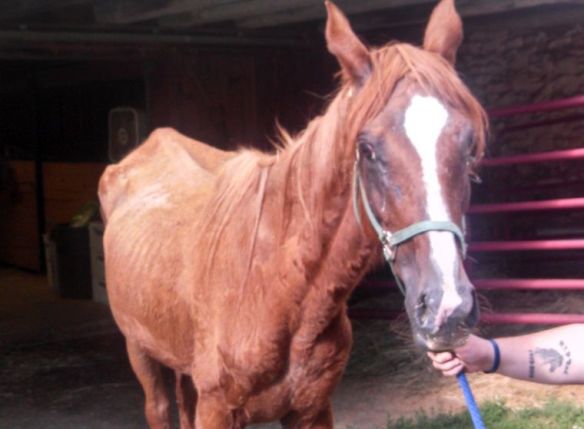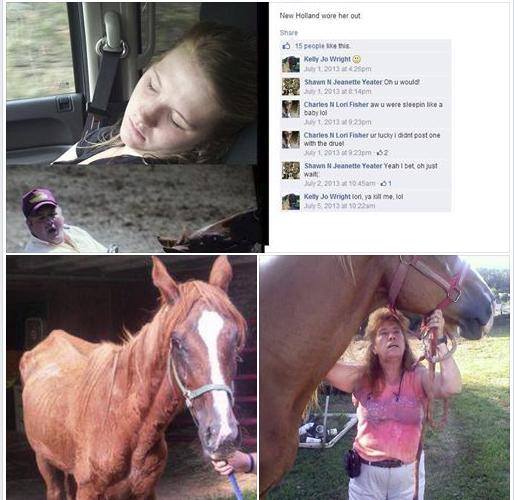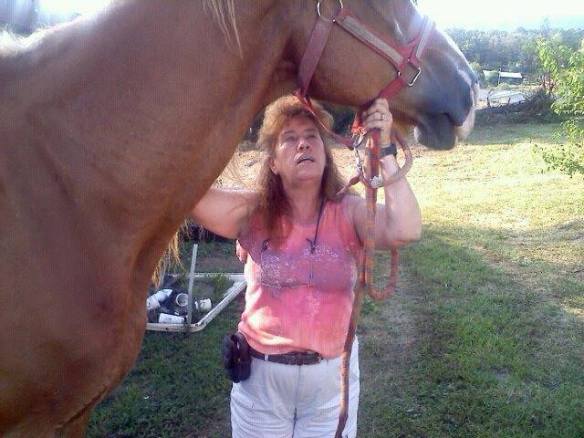~
KILL BUYERS CHARLES AND LORI FISHER, (below first pictured) 900 Lockport Road, Lewistown, Pennsyvania
Charged with multiple counts of animal cruelty at New Holland that led to the deaths of two horses and left a third in a weakened and sickly condition.
Charles N Lori Fisher Face Book Profile ~ HERE
PATTY SHERWOOD (lower right corner of above photo) of 100 Tigger Lane, McClure , criminal partner. Face Book Profile ~ HERE
Miracles Happen for Horses Face Book Page ~ HERE
~
Three horse dealers charged with animal cruelty in case that left two mares dead, a third emaciated and sickly
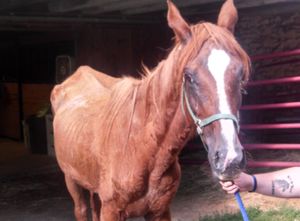 This chestnut-colored horse, now named Anastasia’s Ally, is one of three found in late July in a severely emaciated state in New Holland and is the only one of the three to survive. The 17-year-old mare is recuperating at a horse rescue farm in Woodbine, Maryland.
This chestnut-colored horse, now named Anastasia’s Ally, is one of three found in late July in a severely emaciated state in New Holland and is the only one of the three to survive. The 17-year-old mare is recuperating at a horse rescue farm in Woodbine, Maryland.
By TOM KNAPP | Staff Writer
A Mifflin County couple and a Snyder County woman have been charged with multiple counts of animal cruelty in New Holland that led to the deaths of two horses and left a third in a weakened and sickly condition.
Charles and Lori Fisher of 900 Lockport Road, Lewistown, and Patty Sherwood of 100 Tigger Lane, McClure, were each cited in connection with an incident July 27 outside a New Holland auction house.
According to citations provided by District Judge Rodney Hartman’s office, the defendants were involved with transporting or arranging transport to New Holland of three Arabian-type horses — a roan-colored, a dark bay-colored and a chestnut-colored mare — in “an inhumane manner.”
Because of the “severely dilapidated condition” of the horses, none of them were able to sustain their own weight during transport, the citations say. All three horses were described in the documents as emaciated and lethargic.
The roan horse sustained nerve damage to its leg when it fell, and the bay suffered “further stress and deterioration,” the citations say. Both had to be euthanized.
The 17-year-old chestnut mare survived.
Additional charges of animal cruelty include:
• Depriving the horses of necessary sustenance and veterinary care.
The defendants, the citations say, buy and sell horses frequently and “should have had sufficient understanding” of their medical needs.
• Selling or arranging to sell the animals.
Because of their poor condition, the citations state, the horses “could not be worked or used without violating the laws against cruelty to animals.”
Assistant District Attorney Christine Wilson will prosecute the case against the Fishers and Sherwood, according to the citations.
Each defendant is charged with nine separate instances of animal cruelty in connection with the incident. The DA’s office is asking that each defendant be ordered to pay restitution totaling $4,500 for the horses’ care.
Susan Martin, director of the Lancaster County SPCA, said the animal shelter got involved after receiving a tip about the transaction.
Martin said the horses were allegedly being sold on a Sunday evening in the parking lot at New Holland Sales Stables, 101 W. Fulton St.
The defendants apparently were hoping to sell the horses to a Florida-based horse rescue group, Martin said; she noted that the transaction took place during off-hours at the auction house.
“The auction had nothing to do with this,” Martin said. “They just met in their parking lot.”
The SPCA took immediate custody of the horses, she said, and Brandywine Valley Veterinary Hospital in Coatesville stabilized them and provided critical care treatment for the surviving mare for three weeks.
“Out of the three, only one survived. That’s pretty bad,” Martin said. “The other two were put down right away, the next day.”
According to information provided by the SPCA, the surviving horse was taken on Aug. 13 to Days End Farm Horse Rescue in Woodbine, Maryland.
“She had to go somewhere she could get round-the-clock care,” Martin said.
A release from DEFHR said the horse had a body condition score of 1 (on a scale of 1 to 9, with 1 being extremely emaciated), as well as severe parasite infestation and rain rot.
She has been named Anastasia’s Ally and is recovering.
“She will need extensive critical care for up to 90 days,” the statement, from DEFHR development director Caroline Robertson, said. “Her rehabilitative care will take several months before she will be ready to be evaluated for adoption.”
Martin said the SPCA, which is most often associated with dogs and cats, does get a significant number of calls about other animals, from baby alligators to draft horses.
They’ve handled about a dozen horse-cruelty cases in the past month and a half, Martin said — this was by far the worst she’s seen, and is the only case where any horses had to be euthanized.
Lancaster County SPCA is planning a benefit trail ride Oct. 25 in Lancaster County Central Park to help offset the mare’s rehabilitative costs. Details on the event will be posted online at lancasterspca.org.
More information on DEFHR, a nonprofit organization, is available at defhr.org.
~
A trio of horse dealers in Pennsylvania are facing multiple animal cruelty charges after they allegedly attempted to sell three allegedly maltreated animals through a New Holland, Pennsylvania, auction.
A spokesperson for the Lancaster County Courts said that Charles and Lori Fisher and Patty Sherwood each face multiple animal cruelty charges stemming from the alleged July sale of three horses through the New Holland auction. The spokesperson said the Fishers and Sherwood attempted to transport and sell three allegedly maltreated mares. Of those, two animals died. A third is receiving rehabilitative care.
Authorities subsequently charged the Fishers with multiple animal cruelty counts, multiple counts of transporting an animal in a cruel manner, and using a disabled animal. Sherwood is charged with multiple animal cruelty counts as well as three counts of transporting an animal in a cruel manner and three counts of using a disabled animal.
The Fishers and Sherwood were unavailable for comment.
Lancaster County Society for Prevention of Cruelty to Animals Director Susan Martin said her agency led the investigation into the incident. An anonymous call resulted in the organization’s involvement, she said, declining to comment further.
The case remains pending.
http://www.thehorse.com/articles/34526/pennsylvania-horse-dealers-face-animal-cruelty-charges
~
Patty Sherwood, Charles Fisher, Lori Fisher

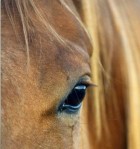 Patty Sherwood, Charles Fisher, Lori Fisher – Pennsylvania/
Patty Sherwood, Charles Fisher, Lori Fisher – Pennsylvania/
27 animal cruelty citations issued to 3 people in New Holland incidents
Pennsylvania horse sellers charged with animal cruelty in deaths of two horses
Two emaciated and lethargic Arabian horses had to be humanely euthanized in an alleged case of animal cruelty on July 27 involving three Pennsylvania horse brokers reported LancasterOnline.com.
Brandywine Valley Veterinary Hospital, Dr. James Holt, in Coatesville provided emergency care for the two horses and treated the surviving mare for three weeks.
The surviving horse, a 17-year-old mare, was transferred to Days End Farm Horse Rescue in Woodbine, Maryland on August 13 for around the clock care. Personnel evaluated the horse’s condition to be a “1” on the horse body rating Henneke scale. (“1” being the worst)
Charged with nine counts each of transporting horses in a cruel manner, using a disabled animal and animal cruelty, are horse brokers Charles and Lori Fisher, of Mifflen County and Patty Sherwood, of Snyder County.
According to the Lancaster Society for the Prevention of Cruelty to Animals, an anonymous call reported that three emaciated horses standing in the New Holland auction parking lot in horrible conditions were about to be transported. There are no horse auctions at New Holland on Sundays when the incident occurred.
On one of the horses, humanely euthanized, the citation stated:
“Transportation of said horse caused the horse to fall down in the trailer while being hauled.
One was “extremely emaciated and lethargic.” A second horse “was unable to sustain its weight for transport due to the emaciated state.” The surviving roan mare was “in severely dilapidated” condition according to the published report.
If you would like to continue receiving the latest news on pet issues and how we can help those who cannot speak, please click the “Subscribe” icon.
Follow the National Pet Rescue Examiner on Facebook by clicking here. Please visit and “like” my page. You are welcome to submit story ideas by contacting me at cdhanna9703@aol.com.
~
Animals’ Angels USA shared a LINK. September 8 We’re thrilled to see charges finally filed in this horrific case!

